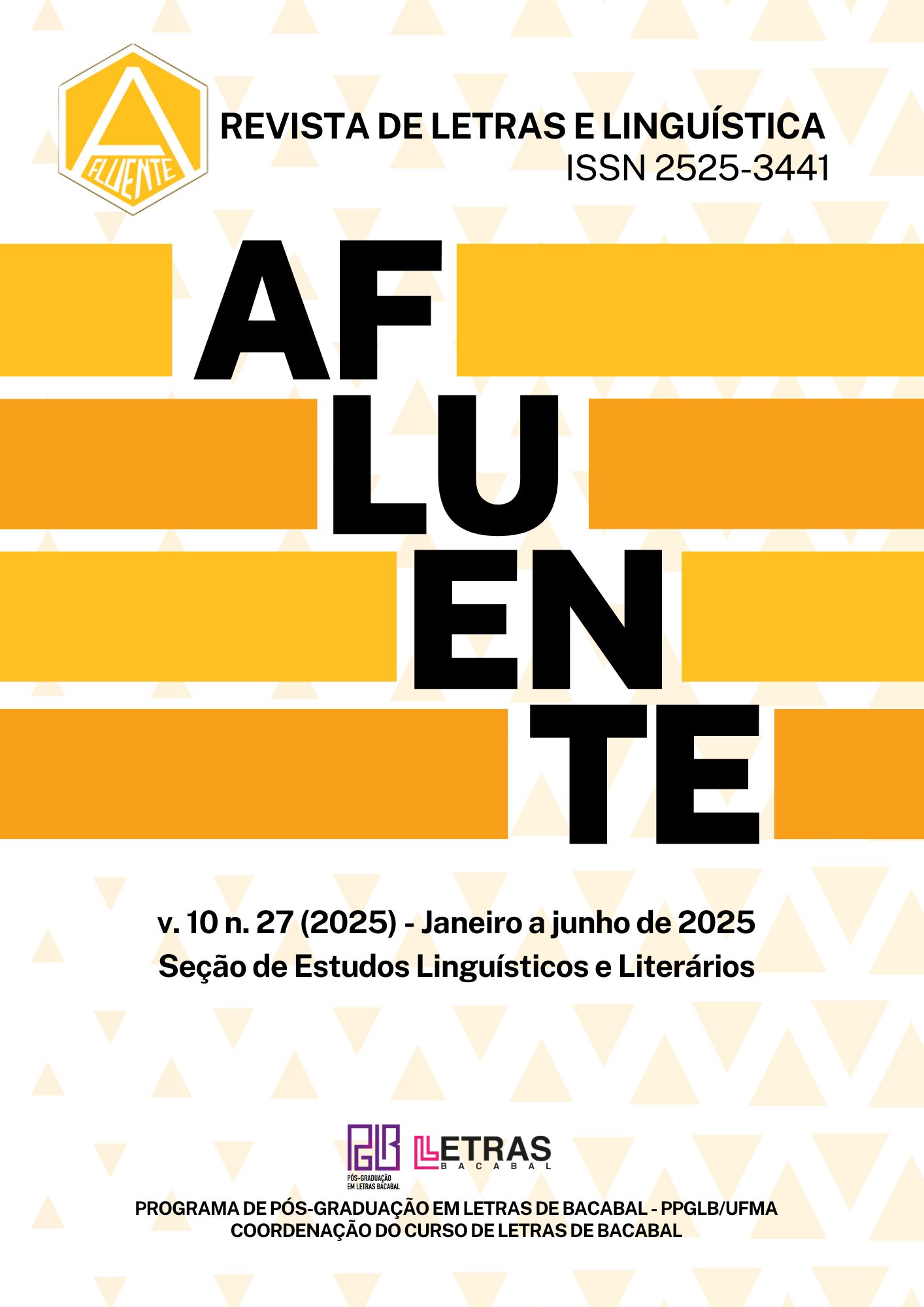Teaching literature through partial reading of novels: the face can hide the strength of the heart
DOI:
https://doi.org/10.18764/2525-3441v10n27.2025.01Keywords:
Teaching literature, José Saramago, Reading and experience, Human formationAbstract
This paper aims to investigate the potentialities and limitations of the partial reading of novels in the teaching-learning process of literature. To this end, it initially describes a teaching and research experience - along with its epistemological basis - that was carried out with third-year high school students from a public school in São Luís do Maranhão, Brazil. It then presents and discusses the results obtained by the proposed activities. This work is methodologically supported by the qualitative paradigm. An interpretative analysis of the activities produced during the project Saramaguear o que (não) há de bom was performed. In the project, a group of students was challenged to read and interpret the first chapters of the novels: Death with interruptions and Essay on blindness, by the Portuguese writer José Saramago. The analysis of the data generated from the relationship among the texts, the students and the teacher showed that the partial reading of a novel associated with the maieutic teaching attitude may open the paths of literary reading and, consequently, of our humanization.
Downloads
References
AGAMBEN, Giorgio. O que é o contemporâneo?. In: O QUE É O CONTEMPORÂNEO? E OUTROS ENSAIOS. Chapecó: Argos, 2009. p. 55–73.
AGUIAR E SILVA, Vítor Manuel de. Teses sobre o ensino do texto literário na aula de Português. Diacrítica, [s. l.], v. 13-14. Revista do Centro de Estudos Humanísticos da Universidade do Minho, p. 23–31, 1998.
BAKHTIN, Mikhail. Estética da criação verbal. 2. ed. São Paulo: Martins Fontes, 1997.
BRITTO, Luiz Percival Leme. Literatura, conhecimento e liberdade. In: [REALIZAÇÃO]INSTITUTO C&A; FUNDAÇÃO NACIONAL DO LIVRO INFANTIL E JUVENIL (FNLIJ) (ed.). Nos caminhos da literatura. São Paulo: Peirópolis, 2008. p. 94–101.
CANDIDO, Antonio. A literatura e a formação do homem. Remate de Males, [s. l.], p. 81–90, 1999. Disponível em: https://periodicos.sbu.unicamp.br/ojs/index.php/remate/article/view/8635992. Acesso em: 4 fev. 2021.
CAPELO, PÚBLICO, Sara. Valter hugo mãe venceu Prémio Literário José Saramago 2007. 2007. Disponível em: https://www.publico.pt/2007/10/26/culturaipsilon/noticia/valter-hugo-mae-venceu-premio-literario-jose-saramago-2007-1308823. Acesso em: 23 set. 2024.
CEIA, Carlos. O que é ser professor de literatura? Lisboa: Colibri, 2002.
COSSON, Rildo. Letramento literário: teoria e prática. 2. ed. São Paulo: Contexto, 2019.
CRUZ, Xosé Antonio Neira. Ler e escrever: os prazeres da intimidade com o livro. In: [REALIZAÇÃO]INSTITUTO C&A; FUNDAÇÃO NACIONAL DO LIVRO INFANTIL E JUVENIL (FNLIJ) (ed.). Nos caminhos da literatura. São Paulo: Peirópolis, 2008.
DUARTE, Newton. A catarse na didática da pedagogia histórico-crítica. Pro-Posições, [s. l.], v. 30, p. e20170035, 2019. Disponível em: https://www.scielo.br/j/pp/a/3rcCdvWdLNrTgDLVdbMqP5R/?lang=pt. Acesso em: 23 ago. 2023.
HAN, Byung-Chul. A crise da narração. Petrópolis: Editora Vozes, 2023.
LARROSA, Jorge. Notas sobre a experiência e o saber de experiência. Revista Brasileira de Educação, [s. l.], n. 19, p. 20–28, 2002. Disponível em: http://www.scielo.br/scielo.php?script=sci_arttext&pid=S1413-24782002000100003&lng=pt&tlng=pt. Acesso em: 27 maio 2020.
LEAHY-DIOS, Cyana. Educação Literária como metáfora social: desvios e rumos. 2. ed. São Paulo: Martins Fontes, 2004.
LISPECTOR, Clarice. Um sopro de vida (pulsações). Lisboa: Relógio d’água, 2012.
MÃE, valter hugo. a máquina de fazer espanhóis. Porto: Porto Editora, 2016.
MENDES, Nataniel. Um menino, uma árvore: representações sociais e repercussões para o ensino de literatura. Revista Letras Raras, v. 11, n. 1, p. 219–235, 2022. Disponível em: http://revistas.ufcg.edu.br/ch/index.php/RLR/article/view/2264. Acesso em: 27 set. 2022.
PENNAC, Daniel. Como um romance. Rio de Janeiro: Rocco, 1993.
SARAMAGO, José. As intermitências da morte. Lisboa: Porto Editora, 2014.
SARAMAGO, José. Ensaio sobre a cegueira. Porto: Porto Editora, 2015.
SARAMAGO, José. Memorial do convento. 52. ed. Lisboa: Caminho, 2012. (O campo da palavra).
SARAMAGO, José. O Conto da Ilha Desconhecida. Porto: Porto Editora, 2016.
SAVIANI, Dermeval. Caracterização geral da Pedagogia Histórico-crítica como Teoria Pedagógica Dialética da educação. In: LOMBARDI, J. C.; COLARES, M. L. I. S.; ORSO, Paulino José (org.). Pedagogia histórico-crítica e prática pedagógica transformadora. Uberlândia: Navegando Publicações, 2021. p. 19–38.
SAVIANI, Dermeval. Catarse na pedagogia histórico-crítica: a concepção de Saviani - Entrevistado Dermeval Saviani. Crítica Educativa, v. 1, n. 1, [Entrevista concedida a Marcos Francisco Martins e Mario Mariano Ruiz Cardoso], p. 163, 2015. Disponível em: http://www.criticaeducativa.ufscar.br/index.php/criticaeducativa/article/view/29. Acesso em: 12 dez. 2022.
SAVIANI, Dermeval. Escola e democracia: para além da “teoria da curvatura da vara”. Germinal: Marxismo e Educação em Debate, v. 5, n. 2, p. 227–239, 2013. Disponível em: https://periodicos.ufba.br/index.php/revistagerminal/article/view/9713. Acesso em: 1 jun. 2021.
SAVIANI, Dermeval. Escola e democracia: polêmicas do nosso tempo. 32. ed. Campinas, SP: Ed. Autores Associados, 1999.
TODOROV, T. A literatura em perigo. 5. ed. Rio de Janeiro: DIFEL, 2014.
Downloads
Published
How to Cite
Issue
Section
License
Copyright (c) 2025 Afluente: Revista de Letras e Linguística

This work is licensed under a Creative Commons Attribution 4.0 International License.
Direitos autorais Afluente: Revista Eletrônica de Letras e Linguística
Este trabalho está licenciado com uma Licença Creative Commons - Atribuição 4.0 Internacional.














